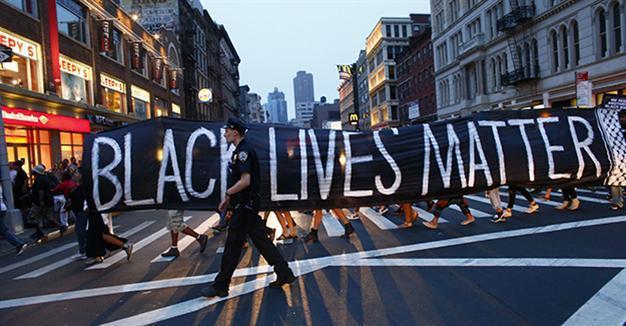Protests over shootings block roads in US cities, arrests made
BATON ROUGE/MINNEAPOLIS – Reuters

Protests against the shootings of two black men by police officers shut down main arteries in a number of U.S. cities on July 9, leading to numerous arrests, scuffles and injuries in confrontations between police and demonstrators.
Undeterred by heightened concerns about safety at protests after a lone gunman killed five police officers in Dallas on July 7, organizers went ahead with marches in the biggest metropolis, New York City, and Washington D.C., the nation’s capital, among other cities.
It was the third straight day of widespread protests after the fatal shooting of Alton Sterling, 37, by police in Baton Rouge on July 5 and the death of Philando Castile, 32, on July 6 in a St. Paul, Minnesota suburb, cities which both saw heated protests on July 9.
The most recent shooting deaths by police come after several years of contentious killings by law enforcement officers, including that of Michael Brown, a teenager whose death in the summer of 2014 caused riots and weeks of protests in the St. Louis suburb of Ferguson.
On the evening of July 9, hundreds of protesters shut down I-94, a major thoroughfare linking the Twin Cities, snarling traffic.
Protesters, told to disperse, threw rocks, bottles and construction rebar at officers, injuring at least three, St. Paul police said. Police made arrests and used smoke bombs and marking rounds to disperse the crowd.
Protesters at the scene said police fired tear gas and rubber bullets. Police said early on July 10 they had begun clearing the highway of debris in preparation for re-opening it.
A march in Baton Rouge saw scuffles between riot police and Black Panther activists, several of whom carried shotguns. Louisiana law allows for weapons to be carried openly.
After a short standoff later in the evening, riot police arrested as many as 30 demonstrators and recovered weapons.
Prominent black activist and former Baltimore mayoral candidate Deray McKesson was among those arrested.
Protests also took place July 9 in Nashville, where protesters briefly blocked a road, and in Indianapolis. A rally in San Francisco also briefly blocked a freeway ramp, according to local media.
Hundreds of protesters marched from City Hall to Union Square in New York. The crowd swelled to around a thousand people, closing down Fifth Avenue.
Some chanted “No racist police, no justice, no peace” as rain fell in New York.
“I’m feeling very haunted, very sad,” said Lorena Ambrosio, 27, a Peruvian American and freelance artist, “and just angry that black bodies just keep piling and piling up.”
New York police said they arrested about a dozen protesters for shutting down a major city highway.
Meanwhile, Dallas was gripped by a new security scare on July 9 triggered by an anonymous threat in the Texas city.
SWAT teams deployed around the Dallas Police Department headquarters while officers investigated reports of a suspicious person in a parking garage - finally giving the all-clear around two hours later.
Police took “precautionary” security measures across the city after receiving “an anonymous threat against law enforcement,” the Dallas police said in a statement.
 Protests against the shootings of two black men by police officers shut down main arteries in a number of U.S. cities on July 9, leading to numerous arrests, scuffles and injuries in confrontations between police and demonstrators.
Protests against the shootings of two black men by police officers shut down main arteries in a number of U.S. cities on July 9, leading to numerous arrests, scuffles and injuries in confrontations between police and demonstrators.